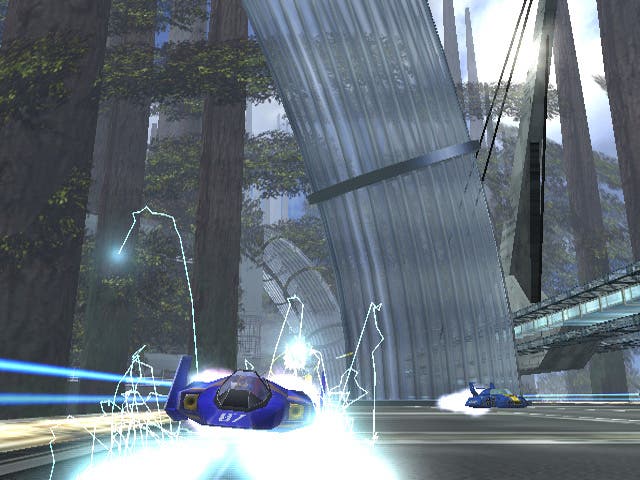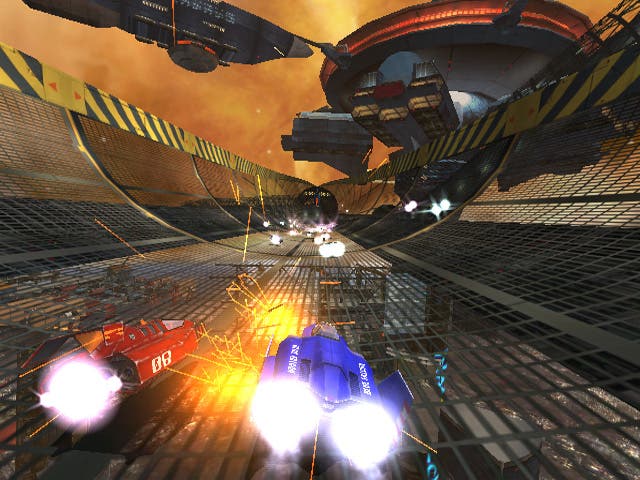E3 2003: F-Zero GX
Rob fondly recalls his last AC/GC concert.
Speed kills, if the Smashing Pumpkins (and indeed Bush) are to be believed, but Nintendo's classic futuristic racing series F-Zero teaches us a rather different lesson. Speed doesn't kill; speed is good, and to be embraced. It's the things we hit while travelling at high speed, and the ground we smash into after flying off the track at hundreds of miles per hour, that kill.
When it comes to insanely fast racing games, F-Zero is the daddy - predating the more populist WipEout by an entire console generation, with the still surprisingly playable original SNES version of F-Zero. The N64 title, F-Zero X, was largely overshadowed by Psygnosis' homage, which caught the spirit of the clubbing scene at the time and sold rather a lot of PlayStations, but X was arguably a far better game in the pure racing sense. Now Nintendo is updating the franchise for the GameCube and for the TriForce arcade system, but after the lacklustre public response to the rather uninspired Wipeout Fusion, the question must be asked - do we really care about futuristic racers any more?
Petrol Head

If we don't, then F-Zero GX may well be the game to make us care all over again. Aficionados of the series will recognise most of the elements in place here - massive tracks covered in gravity defying loops, half-pipes and jumps, tens of vehicles on screen at once, ridiculous top speeds and boost pads to make the whole thing even faster. Indeed, one of the first things we realised after playing F-Zero GX for just a few minutes was that Nintendo clearly don't think that much was broken about F-Zero X, and as such they haven't messed around with the formula a great deal.
That's not to say that the game isn't a substantial update in other ways. Obviously, it looks far better than F-Zero X, with detailed tracks and vehicles and backgrounds littered with bizarre buildings and structures. The addition of environmental effects like lightning adds an extra touch to the game, and perhaps most importantly, the whole thing still cracks along at a perfectly smooth framerate. It's hard to tell when you're playing a game at a trade show, but we'd stake a bet that F-Zero GX doesn't drop below 60 frames per second at any point, even when all hell is breaking loose in front of you as ten cars ram into each other at 300 miles per hour.
The tracks on show were also all new, and ranged from the relatively simple oval circuit to a fiendishly difficult track that sported jumps, right angled turns, and gaping holes in the middle of the track that invited careless players to their messy doom. One thing we do trust the F-Zero team not to mess up is the difficulty curve of the game; F-Zero X offered one of the best difficulty curve balances of any game we've ever played, leading players through its range of high-speed antics by the hand so that the game became difficult, not frustrating. If the tracks we've seen in GX are anything to judge by, difficult is certainly a word you'll be using for later stages of the game, but hopefully frustrating won't be a word that springs to mind alongside it.
Falco Punch!

There's a certain degree of tweaking possible to your vehicle and driver, and from what we could see of the game, it's possible to select vehicle and driver separately - presumably different combinations will yield different effects. However, this is no Gran Turismo - the only real tweaking on offer is the ability to set the bias of the curve between acceleration and top speed. Don't expect to be replacing the wing nuts of your anti-gravity drive with higher performance versions or filling your windscreen wiper reservoir with more expensive detergent - this is as pure an example of an arcade racing game as you're ever likely to find.
That, perhaps, may be the downfall of the title for a lot of gamers. We love the fact that Nintendo hasn't followed the herd in this respect and tried to complicate the gameplay. You race very fast, you lose energy through bouncing off obstacles and other players, and you gain energy by driving over special energy pads on the track. That's essentially it - all of the complexity and learning in the game lies in mastering the handling of your vehicle, which as far as we're concerned is exactly how F-Zero should be.
However, gamers weaned on the likes of Wipeout or even Extreme-G (no sniggering, the last one was actually really good) may find this all a bit too simple for their tastes, quite simply because F-Zero doesn't have weapons. Other futuristic racers love their weapons, from rockets and shields to insane devices that cause earthquakes; F-Zero eschews all of that in favour of a plain racing experience. F-Zero GX continues the legacy of its predecessors unerringly, and the fact is that the game is incredibly good fun (and like F-Zero X, will probably be a fantastic addition to any multiplayer game repertoire) - but it remains to be seen whether a game which isn't really particularly different from its N64 predecessor can catch the imagination of the game-buying public.

